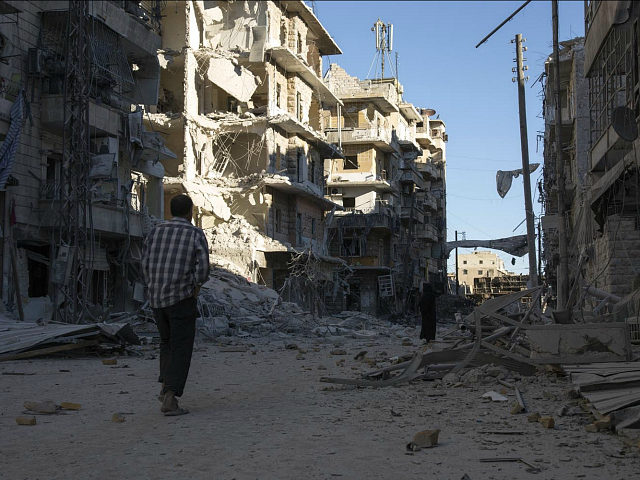The Russian government is putting together a meeting on November 18 between the Syrian government and opposition groups to talk about resolving the Syrian civil war.
Opposition leaders quoted by the Associated Press denounced the Russian initiative as an effort to undermine United Nations talks scheduled for just ten days later in Geneva.
Senior opposition negotiator Alise Mofrej accused Russia of “trying hard to cancel” the U.N. meeting by holding its own event in Sochi. Another opposition leader said Russia was trying to “bypass” the U.N. and its resolutions. A third, negotiator Mohammad Alloush, scoffed at the Russian-sponsored conference as “a meeting between the regime and the regime.”
U.N. Special Envoy for Syria Staffan de Mistura strongly urged all parties to attend the next round of talks in Geneva when they were first announced in September. He urged the regime of President Bashar Assad to “show a genuine interest in having negotiations about credible, inclusive local and central governance, a schedule and process for a new constitution, and UN-supervised elections.” He told the opposition to “show its unity and readiness to speak in one voice” and take the opportunity to overcome their differences.
“Let me caution both sides and their backers against illusions of victory or dreams of shortcuts. There is no substitute for an internationally supported process based on a comprehensive and inclusive approach that also helps Syrians to re-discover a modicum of trust and social cohesion after the bitterest of conflict,” said de Mistura.
The four key points of stressed by the U.N., referred to as the “four baskets” by envoys, are “a credible non-sectarian transitional government; a future constitution; early and free parliamentary elections within 18 months; and a united war against terrorism within Syria.” The opposition might be able to coalesce around those goals, but Assad and his backers in Russia and Iran are not much interested in “non-sectarian transitional government.”
Assad does like the idea of writing a new constitution because, as the UK Guardian explains, he believes it will be drafted by his Russian backers to “entrench him in power ahead of any elections.”
Opposition groups seem united in their judgment that Russia is trying to circumvent “the international desire for political transition,” as the Syria National Coalition put it. In other words, they want an alternative peace process that accepts Assad as dictator in perpetuity.
The Guardian quotes Western diplomats who believe the enormous cost of reconstruction in Syria is the last, best hope to draw the Syrian government into a U.N. and European Union-sponsored negotiating process that could end with Assad leaving Damascus. Russia, conversely, is reportedly attempting to block the renewal of a U.N. resolution that allows humanitarian aid to enter Syria without the involvement of the Damascus government, an obvious ploy to bolster Assad’s power while marginalizing the United Nations, United States, and the European Union.
Controlling humanitarian aid would give Assad tremendous leverage over rebel factions. The U.N. estimated on Tuesday that over 250,000 Syrians were displaced by fighting in October alone. 13 million people are in need of food assistance, 6.3 million of them especially vulnerable due to “displacement, hostilities, and limited access to basic goods and services.” The cross-border assistance Russia seeks to stifle was credited with delivering aid to 2.76 million people a month.
Turkey joined the Syrian opposition groups in expressing reservations about Russia’s plans for a summit in Sochi, but on rather different grounds: the Turks did not like Russia extending an invitation to the Syrian Kurds.

COMMENTS
Please let us know if you're having issues with commenting.